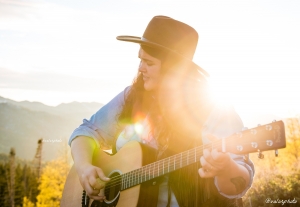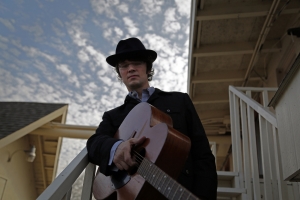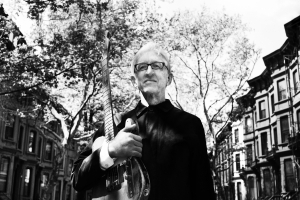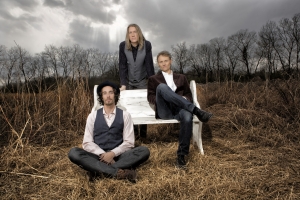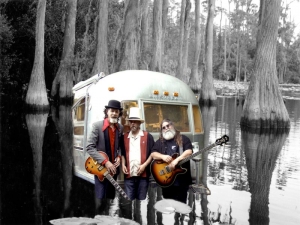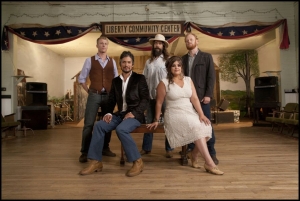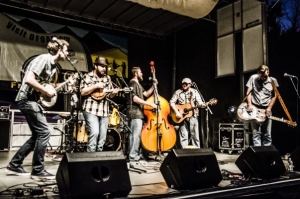Displaying items by tag: roots
Michelle Moonshine
Singer-Songwriter Michelle Moonshine's original songs have an upbeat tempo, catchy vocal lines and heartfelt lyrics; but it's her unique voice that truly engages a listener at a performance. Her timbre can be described as incredibly sweet and whimsical, and is yet saturated in feeling that makes you want to stop and listen to every word. During her four years of performing, Michelle has garnered recruitments from NBC's The Voice in 2014 (which she turned down after being accepted); and from America's Got Talent in Fall 2015 which is still ongoing. Within that time she has put a national tour under her belt and honed her craft in producing her own blend of Country-esque Americana. Regularly performs solo as well as with her band as both a three and four piece with new member John Davis on electric guitar, lap steel and backup vocals. In the rhythm section is Goose on the drum kit and Bronk on the upright bass, who both have some classical training which adds to the dynamic. With a fully funded Kickstarter, they completed their first album and plan to tour their new release this Spring.
Luther Dickinson Trio
“To me, music is food and you need a variety to stay healthy and strong,” - Luther Dickinson on his prolific musical output, which, at last count, includes three new, somewhat divergent roots albums planned for 2015.
When Luther Dickinson was growing up in rural Mississippi — just 40 miles south of Memphis, but deep in the hill country — his favorite band was Black Flag, the caustic L.A. punk band that defined the hardcore movement in the 1980s. That may surprise listeners who have been following his career as a folk-blues-rock innovator. With his brother Cody, Luther is a charter member of the North Mississippi Allstars and has recorded with an amazing array of musicians over the years: Beck, Patty Griffin, Mavis
Staples, John Hiatt, Buddy Miller, RL Burnside, Lucero, Jon Spencer, and Robert Plant. He’s also produced albums by Jim Lauderdale, Amy LaVere, and Otha Turner, whose Everybody’s Hollerin’ Goat was named one of the top 10 blues records of the ‘90s by Rolling Stone.
Bill Kirchen
"He is one of the singular instrumental stylists of American roots music, and to hear his sound once is to have it indelibly etched on one’s musical memory."- Pop Matters
Grammy nominated guitarist, singer and songwriter Bill Kirchen is one of the fortunate few who can step onto any stage, play those trademark licks that drove his seminal Commander Cody classic Hot Rod Lincoln into the Top Ten, and elicit instant recognition for a career that has spanned over 40 years and includes guitar work with Nick Lowe, Emmylou Harris, Doug Sahm, Elvis Costello and many more. Named “A Titan of the Telecaster” by Guitar Player Magazine, he celebrates an American musical tradition where rock 'n' roll and country music draws upon its origins in blues and bluegrass, Western swing from Texas and California honky-tonk. His current CD Word To The Wise on Proper American features duets with many of these artists he's worked with, including Elvis, Nick, Maria Muldaur and Dan Hicks.
Fred Eaglesmith
The heart of rock and roll is alive and well with Fred Eaglesmith’s 20th album, Tambourine. Fusing together all of Fred’s past influences, the result is pure rock ‘n ‘roll reminiscent of 1966.
Eaglesmith is a veteran of the music industry and at the same time is about as far away from actually participating in today’s music industry as one could be. Never operating within anyone’s boundaries, he continues to set the standard for independent artists everywhere. While blazing his own often colourful path he has avoided most of the traps and pitfalls of his peers, his career reads like a manual on how to succeed in music today without trying to fit into the traditional business models.
Humming House
The spotlight on Nashville, with its musical values and timeless traditions, is currently bright. And no band embodies what’s right about 21st century Nashville more completely than the quintet known as Humming House, “…a solid Americana band with Irish folk influences and a tight live show.” Consequence Of Sound
It’s the way they weave together threads of Music City’s folk, soul, and bluegrass legacies. It’s in the inspirational and revealing songwriting. It’s in their acoustic instrumentation, presenting mandolin, fiddle, acoustic guitar and bass in fresh roles. It’s in the pleasant tension between rousing energy and nuanced arrangements. And it’s in the voices, with two complimentary stylists up front and backed by the full band’s rapturous harmonies.
The Wood Brothers
Two brothers decide to form a band, adapting the blues, folk and other roots‐music sounds they loved as kids into their own evocative sound and twining their voices in the sort of high‐lonesome harmony blend for which sibling singers are often renowned.
Swamp Cabbage
Saturday 1:30pm
"Rootsy, southern-fried blues doesn't come much more boggy than Swamp Cabbage." Jon Sobel - BlogCritics.org
The Black Lillies
“With one foot planted firmly in Appalachian music culture and the other always expanding and evolving, the Black Lillies have created a unique sound embraced by fans old and young.”
- Vanity Fair
Black Lillies front man Cruz Contreras knows a thing or two about the road.
After co-founding Robinella and the CCstringband with his wife, he spent nearly a decade traveling the road and making music from coast to coast. When his marriage – and the band – dissolved in 2007, he returned to the road ... this time, as the driver of a truck for a stone company. It was here, over a year spent rolling down the highways of East Tennessee, that the songs and sounds that would form the nexus of The Black Lillies were conceived.
And "Runaway Freeway Blues," the band's third studio album, was realized exactly there ... on the road. When the Lillies weren't playing their 200-odd gigs during 2012, they were in Wild Chorus Studio in their hometown of Knoxville, Tenn., working with Scott Minor of Sparklehorse to craft a beautiful ode to restless spirits and rambling hearts. Rooted in the mud-rutted switchbacks of Appalachia, "Runaway Freeway Blues" is the sound of a band that's becoming something of a phenomenon across the country.
Contreras and his bandmates – harmony vocalist Trisha Gene Brady, multi-instrumentalist Tom Pryor, bass player Robert Richards and drummer Bowman Townsend – have grown from a few friends sitting around campfires and living rooms to a band that shows up in far-flung cities where folks to whom they've never played before already know the words to the songs. Eschewing record labels, they've still managed to conquer the Billboard Top 200 charts (Runaway Freeway Blues debuted at #43), put three tracks in Country Music Television's top 12 requested videos, and film a nationally broadcast commercial for Twizzlers. They've been featured on numerous television specials and played festivals as widespread as Bonnaroo, Rochester Jazz Festival, MerleFest, and CMA Fan Fair. Despite trafficking in a richer, more authentic brand of country and Americana than what gets played on mainstream country radio, they've still been invited to perform at the Grand Ole Opry more than twenty times – a record for an independent act.
The Black Lillies, in other words, have come a long way from those early days, when Contreras channeled heartache and regret into a stunning debut. "Whiskey Angel" was the sound of a man drowning his sorrows, and an introduction to someone who had languished behind the scenes for too long. As the guy who loaned out his initials to Robinella and the CCstringband, which flirted with national fame a few years ago with a hit ("Man Over") on Country Music Television, an appearance on "Late Night With Conan O'Brien" in 2003, and albums on both Sony and Dualtone, he was known best as a mandolin virtuoso and bandleader.
Starting over, he stunned friends and peers in the East Tennessee music scene with a voice that makes you think of Randy Travis or Dan Tyminski or even the great Ralph Stanley in his prime: steeped in regret, seasoned with pain and tempered in the fires of hard times. It served "Whiskey Angel" well, and when "100 Miles of Wreckage" was released in 2011, the band seemingly burst onto the national stage – spending five solid months in the Americana Music Association's radio charts (four of them in the top 15).
That record was the sound of a man taking stock of his life and his past, regarding the pain and the turmoil with a measure of wistful acceptance. Which brings us to "Runaway Freeway Blues," which finds the band focused on the horizon, filled with the nervous energy of excitement at the unknown future waiting on the other side of that distant hill, enthusiastic about the journey as much as they are about the destination.
The emotional arc of the new record is brilliant, so vivid and detailed with lush harmonies and instrumental virtuosity that's as powerful in the quieter moments as it is explosive during jubilant ones. You can cherry-pick any number of songs from "Runaway Freeway Blues" and find gold. Banjo, pedal steel, piano and everything else lift this record up on wings of uncommon grace and stunning vitality, and when Contreras and Brady combine their voices, it calls to mind classic duets from times long gone: George and Tammy. Gram and Emmylou. Johnny and June. From gentle Laurel Canyon folk rock to the honky-tonk heartache of classic country to winding jams, "Runaway Freeway Blues" is an album that defies easy categorization.
It was conceived on the road, inspired by the road and completed there as well: Contreras mixed the album while on tour, by phone and email, coordinating overdubs and guest instrumental appearances (Josh Oliver, formerly of the everybodyfields; banjo player Matt Menefee, who's toured with Mumford & Sons, Levi Lowery and Big & Rich; and a host of Tennessee's finest musicians on horns, harmonica and percussion) while playing into the wee hours of the morning, driving all night and setting up in the next city to do it all over again.
It's breakneck, brazen and beautiful. It's the sound of a band that's rooted in East Tennessee but more at home piled into a van stacked with gear, windows down and aimed toward the next gig. It's an album that lets long-time fans as well as relative newcomers to the Black Lillies phenomenon know that this train isn't stopping anytime soon.
The Hillbenders
The dynamic bluegrass quintet from Springfield, MO with their high-octane shows, tight harmonies and stunning instrumental prowess, have been winning fans and making waves at every festival they have been invited, and consequently re-invited to since their formation in 2008. Recently signed to Nashville-based roots music company the Compass Records Group, the HillBenders will release their new album Can You Hear Me? on September 25th, presenting an intensely charismatic album imbued with the spirit and energy of their live shows. "Our music appeals to anyone that can enjoy a fun performance. We share a passion for the music, a passion to perform," says guitarist Jim Rea, "It's evident we have fun on stage. People come up to us and say sarcastically, 'liven up!'"
Thus the challenge in recording Can You Hear Me?" was clear — the band had to capture their undeniable live appeal on the twelve tracks, eight of which are originals. Lead singer and mandolinist Nolan Lawrence with Jim Rea and his cousin Gary Rea on guitar and bass respectively, banjoist Mark Cassidy and Dobroist Chad "Gravy Boat" Graves channeled the rawness and intensity of bands like Newgrass Revival into the carefully executed arrangements. They worked closely with roots music engineer and producer Bil VornDick for an album that aligned their diverse tastes and styles while showcasing the collective talent of each band member, including a grassified cover of the Romantics' "Talking in Your Sleep" and Hal Ketchum's country hit, "Past the Point of Rescue," which includes a samba-grass breakdown after the second chorus.
The album-opening "Train Whistle," is a rambling train song, a staple to the bluegrass band, though the band hesitates the genre distinction. "Bluegrass is where we found our voice as performers, so we feel like we owe a lot to it. We have one foot in bluegrass all the time while the other is reaching out and exploring our interests in rock and roll, jazz, funk and Americana," says Chad. By winning the Telluride Bluegrass Band Competition in 2009 and the National Single Microphone Championship the following year, the band became favorites on the bluegrass festival scene with their own brand of acoustic fusion. "A lot of people, even at the more traditional festivals, tell us 'You guys are so fun to listen to!' This comes from the die-hard traditionalists. They are saying that it is really refreshing to see something new. At the same time we're not afraid to be looked down upon – all of that formality melts away when we just be ourselves."
The HillBenders recognize their ability to bridge the gap between the common music consumer and the bluegrass genre, selecting material for the album that defies any hillbilly stigmas. Nolan comments, "With our widely varied influences, we're all trying to bring in songs that unify. We wanted to pair bluegrass with the other American music we grew up with —rock and roll!" Their festival appearances also reflect the crossover; the band recently played the very traditional Gettysburg Bluegrass Festival and the esteemed Philadelphia Folk Festival on back to bay days on the same weekend.
Still, the heart of the new album draws from the band's live performances. Nolan adds, "If the music isn't played with intensity, you can tell. You have to play the music with that passion or it just isn't going to sound right." Can You Hear Me? is an album that showcases a young band with ambition and talent at a volume that comes across loud and clear.
The Duhks
"Canada's premier neo-tradsters romp from world-beat to blues, urban-pop to old-timey, with wild-eyed invention, haunting traditionalism, and spine-rattling groove." (Scott Alarik, The Boston Globe) GRAMMY nominees and JUNO award winners, seeing The Duhks live is nothing short of a spiritual experience. A syncopated bluesy banjo number seamlessly follows a Brazilian samba; an old-time jaunt nestles comfortably next to a gospel performance. One of the most musically adventurous bands to come from the roots scene in the past decade, The Duhks return to the stage is definitely a cause for celebration.

